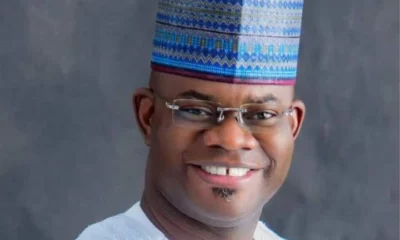Energy
Petrol price set to be increase to N180 per litre


The Federal Government may increase the price of Premium Motor Spirit (PMS), popularly called petrol to a minimum price of N180 and above anytime soon.
Minister of State for Petroleum Resources, Dr. Ibe Kachikwu who dropped the hint in Abuja on Thursday, said the current price of N145 per litre can no longer be sustained.
In a presentation he made to a joint committee on Petroleum (Downstream) of the Senate and the House of Representatives, the Minister said the landing cost for petrol stood at N171 per litre.
According to him, the Federal Government, through the Nigerian National Petroleum Corporation (NNPC) has been bearing the cost of N26 per litre, representing the difference between N171 and the current official price of N145 per litre.
Insisting that independent marketers would not be able to import the product at the current foreign exchange rate, saying the marketers were able to sell for N145 per litre when the exchange rate was N285 per Dollar. The Naira presently exchanges for N365 per Dollar.
“We now have to go back and find the solution to this problem in order to ease supply gaps and ensure availability of the product at all times,” the Minister said.
Kachikwu, however, proffered three alternative solutions to pump price increase: getting the Central Bank of Nigeria (CBN) to introduce a modulated foreign exchange rate specifically for importers of the product; giving the marketers significant tax adjustments to enable them to absorb the high cost; and a plural pricing system whereby the NNPC would continue to sell at N145 through its numerous outlets while the marketers are allowed to fix their own price.
The Minister identified causes of the last fuel scarcity to include diversion of products, logistic constraints, bottleneck associated with clearance, bad road network, insufficient product reserves, smuggling through land borders, supply gaps and enforcement challenges.
He stated that the marketers stopped importing fuel since October 2017, as a result of their inability to access foreign exchange from the CBN, leaving only the NNPC to import the product, which has left a wide gap between demand and supply.
Dr. Kachikwu lamented that the price of petrol rises with the rise in the price of crude oil in the international, stressing that in such instances, Nigeria spends more to import refined products. In effect, any rise in crude oil price increases the amount the country spends on the importation of fuel.
To address the situation, the Minister canvassed the opening up of production lines, specifically the refineries, which he said, would address supply gaps that usually leads to incessant scarcity.
“Rising prices in international market affecting domestic prices. What the country needs is to have the refineries working. It’s a shame that after 40 years, Nigeria cannot produce its domestic consumption.
“It would take 18 months to address problems of scarcity, price stability and other issues relating to the supply of petroleum products. The pipelines should be concessioned to allow private participation.
“There is huge infrastructure deficit in the system because the NNPC ought to be distributing products through their pipes but most of the pipes are damaged. The has necessitated the use of trucks to distribute the product across the country.
“Most importantly, fixing the refineries should be the lasting solution. To discuss and address the issues, we have to seek approval from the President,” the Minister said.
In his own submission at the hearing, the Group Managing Director of the NNPC, Dr. Maikanti Baru said the last scarcity was caused by rumours of price increase in the media that led marketers into hoarding the product in anticipation of higher prices.
Said he: “So there was a frenzy in the movement of products to the hinterland and diversion of products going to the hinterland in anticipation of the increase in price.
“The NNPC, or the Petroleum Products Pricing and Regulatory Authority (PPPRA) had no mandate to increase pump price.”
The GMD said that the strike action embarked upon by PENGASAN in December was partly responsible for the scarcity, saying issues raised by the association for going on strike had nothing to do with the NNPC.
According to him, the strike triggered panic buying by members of the public leading to scarcity of the product. He added that although PENGASAN called off the strike on December 18, the damage had already been done.
Baru identified other factors responsible for the last scarcity to be the higher price at which petrol is sold in neighbouring African countries, citing Cameroun where he said petrol sells for N300-N400 per litre.
Stating that the NNPC has enough product to bridge supply gaps, Baru insisted the corporation has sufficient stock to go round even without importation.
The GMD alleged that about 4500 distribution trucks failed to return to depots to complete their distribution formalities during the scarcity period, meaning that the trucks were diverted.
“There was no supply gap because we have Direct Sale Direct Purchase (DSDP) agreement with 10 consortia involved. Three of them rejected their cargoes, which were reallocated to others.”
The GMD also hinted that the refineries in Kaduna and Port Harcourt were being reactivated and restreamed and that they have been producing three million litres daily.
Baru also cited disagreements among the various private operators in the sector as part of the problems that threw up the scarcity, adding that the marketers were busy trading allegations of sharp practices.
He said: “For instance, IPMAN said MOMAN and DAPPMA were charging over N133.28/litre but when we asked them to provide evidence of overcharging, they could not provide any. If proven, NNPC would have withdrawn the licenses of the errant bodies.”
The Executive Secretary of the Department of Petroleum Resources (DPR), Mordecai Baba Ladan told the committee that at the outset of scarcity, the DPR rolled out its machinery across the country, with the directive from the Minister that defaulters be dealt with.
“Almost every marketer/filling station across the country are defaulters. And if all defaulting filing stations were to be shut down, there may not be anyone left.
“They horde, sell above official price and also divert products. But we have stepped up our monitoring process now that the NNPC is the sole importer but the corporation cannot do it alone.
Virtually all the independent marketers that attended the hearing alleged multiple charges by the Nigerian Port Authority (NPA), NIMASA and some state governments charging 3 kobo per litre wharf landing fee.
The Executive Secretary of MOMAN, Mr. Obafemi Olawore said the N800 billion owed marketers by the Federal Government has made it difficult for them to obtain credit from the banks to import the product.
He appealed to the government to give key players major roles in the importation business, saying that shutting down errant filling stations won’t solve the scarcity problem but rather aggravate it.
Olawore called for total deregulation of the sector to allow more participants from the private sector.
Curiously, however, the chairman of the joint committee, Senator Kabiru Marafa who had vowed to grill the Minister and the GMD over secret subsidy payment by the government.
Briefing newsmen at the National Assembly on Friday, Marafa had raised questions on who pays the difference of the N26 in the landing cost of N171 against the pump price of N145.
The lawmaker said there were indications that a subsidy of N26 was being paid on every litre of petrol sold in the country and wondered who has been paying the subsidy.
Marafa had said, “If there is subsidy payment, then who approved it and how much has been paid out as the subsidy so far. If you want to provide the subsidy, it should come through the National Assembly but we have not received any request for subsidy payment from the Executive arm.”
Stating that about N10 trillion has been paid out as the subsidy, Marafa had lamented that stakeholders in the Petroleum industry, particularly the NNPC, have not been transparent in the running of the sector.
He said these were some of the issues the Minister of State for Petroleum Resources, Dr. Ibe Kachikwu, Baru and others would be made to explain to Nigerians at the January 4 hearing.
“We are going back to the same circle where only a few persons benefit from subsidy payment at the expense of the Nigerian people,” Senator Marafa had said.
Other members of the joint committee are Senators Tayo Alasoadura, Mao Ohuanbunwa, Sabi Abdullahi, Foster Ogola, Yahaya Abdullahi, Rose Oko, Philip Aduda among others.
Source:- The Nation
Energy
AVEVA Appoints Joanna Mainguy as New Sustainability Accelerator Director


- Joanna Mainguy will steer strategies for sustainability innovation across AVEVA’s portfolio and partner ecosystem, furthering ESG targets for 2025 and beyond
AVEVA, a global leader in industrial software, driving digital transformation and sustainability, today announced the appointment of Joanna Mainguy as Sustainability Accelerator Director.
Joanna’s appointment testifies to AVEVA’s dedication to strengthening the company’s sustainability impact in line with advancing global climate commitments.
As Sustainability Accelerator Director, Joanna Mainguy will focus exclusively on sustainability solutions and strategies to accelerate innovation that will help AVEVA’s customers to achieve their net-zero targets.
She will look at how AVEVA leverages current market and customer analysis to inform its in-house development team, advise on new customer collaborations and on how AVEVA should grow its partnership network and M&A pipeline to reflect its sustainability priorities.
Joanna will lead the implementation of a sustainability solutions plan tailored to meet the most pressing needs of AVEVA’s industrial customers on low-carbon transition, circularity and resilience, via an integrated product, marketing and sales approach. She will work closely with AVEVA’s portfolio, business area and R&D leads to continue to develop new sustainability capabilities and drive collaboration on go-to-market initiatives that support industry with contributing to an accelerated energy transition and shift to a circular economy.
Joanna was formerly Industry Director, EMEA, for Energy & Sustainability at Microsoft, where she led strategic engagements with major energy providers and supported the energy transition with digital solutions. She has worked across the entire energy value chain and has more than 15 years of experience in process industries and the energy sector, including work for major system integrators, software and energy companies.
Lisa Wee, Global Head of Sustainability, AVEVA, said: “We are excited to welcome Joanna to AVEVA. She will bolster our mission to enable faster uptake of existing sustainability solutions across the industrial landscape, while in parallel we continue to invest in product capabilities and partnerships that will push out the frontiers of sustainability innovation for industry. At AVEVA we look to lead by example on sustainability and we achieved a 93% reduction in Scope 1 and 2 emissions last year. We aspire to help our customers better leverage digital solutions to realize their own ambitious sustainability targets early, and Joanna brings a wealth of experience to help support this.”
Commenting on her appointment, Joanna Mainguy, Sustainability Accelerator Director, AVEVA, said: “I am delighted to join AVEVA at such a pivotal time in its sustainability innovation and growth trajectory. I look forward to working with AVEVA teams and customers to continue to grow the sustainability benefits that can be achieved with AVEVA software. I am also keen to work closely with our partners to drive further positive change at scale, since we know addressing the climate crisis will continue to require expanded collaboration”.
AVEVA actively embeds sustainability into its core product strategy with specific capabilities in its software portfolio.
AVEVA’s software enables organizations to connect and contextualize key sustainability data with artificial intelligence and human insight, enhancing their agility, resilience and sustainability in order to help drive responsible use of the world’s resources.
AVEVA’s 2023 Sustainability Progress Report reveals significant progress across all three pillars of the company’s sustainability framework, encompassing product strategy, operations and culture.
Energy
Climate Change: NNPC Ltd/Total Energies JV Achieves Zero Gas Flare



In pursuit of meeting the targets of 20% (unconditional) and 47% (conditional) greenhouse gas emission reduction as contained in the Nationally Determined Contribution under the Paris Accord signed by the President Bola Ahmed Tinubu administration, the NNPC Ltd/TotalEnergies Joint Venture has achieved zero routine gas flare in all its assets.
According to a statement signed by Olufemi Soneye, Chief Corporate Communications Officer, NNPC Ltd., this feat was announced on Thursday during an inspection tour of OML 100 in South-eastern Niger Delta, off Port Harcourt, by a joint NNPC Ltd and TotalEnergies Team to ascertain the success of the OML Flare Reduction Project launched in December 2023.
The NNPC Ltd/TotalEnergies Joint Venture, which is the concession holder of four leases, had hitherto achieved zero routine flaring across OML 99 (2006), OML 102 (2014), and OML 58 (2016), leaving OML 100 as the only lease with routine flaring going on.
The significance of this achievement is that the last routine flare volume of about 12MMscf/d (twelve million standard cubic feet per day) of gas has now been eliminated giving rise to a greenhouse gas emissions reduction of about 341KtCO₂e/yr.
The achievement is an outcome of a programme introduced by the NNPC Ltd to galvanize action towards achieving the zero routine flare by 2030 across its portfolio of assets.
It is also a testament to NNPC Ltd’s prioritization of sustainability anchored on the ‘first R’ of its 5R Strategy (Reduce, Replace, Renew, Re-plant, Repurpose), as it strives to reduce its carbon footprint.
Work is ongoing across all other assets within NNPC Ltd’s Upstream Directorate to ensure that all assets achieve zero routine flaring by 2030 or earlier.



In line with President Bola Ahmed Tinubu’s directive to the Nigerian National Petroleum Company Limited (NNPC Ltd) to optimise production from the nation’s oil and gas assets, the Company has announced the successful commencement of oil production from the Akpo West Field.
The milestone, which is the result of meticulous planning, strategic collaboration, and unwavering dedication from all stakeholders involved in the project, will add 14,000 barrels per day condensate to the nation’s production. This will be followed up by the production of about 4million cubic meters of gas per day by 2028.
The development of Akpo West which is on Petroleum Mining Lease (PML) 2 (formerly OML 130) leverages the existing Akpo Floating Production Storage and Offloading (FPSO) facility via a subsea tie-back to keep costs low and minimize greenhouse gas emissions.
The milestone was enabled by the strategic leadership of the Group Chief Executive Officer (GCEO), Mr. Mele Kyari, and the Upstream Directorate of the NNPC Ltd whose support played no small role in propelling the operators to actualise the short- and mid-term hydrocarbon production goal of the President Tinubu administration.
Located 135 kilometres offshore, Akpo West is one of the discoveries on PML 2 with proximity to the Akpo main which started up in 2009 and produced 124,000 barrels of oil equivalent per day in 2023.
PML 2 is operated by TotalEnergies with a 24% interest, in partnership with CNOOC (45%), Sapetro (15%), Prime 130 (16%), and the Nigerian National Petroleum Company Ltd as the concessionaire of the Production Sharing Contract (PSC).
-



 Spotlight4 days ago
Spotlight4 days agoPresident Tinubu Congratulates Tunde Onakoya On Guinness World Chess Record
-



 Politics4 days ago
Politics4 days agoGovernor Of Delta State, Sheriff Oborevwori Visits Fled Community Of Okuama, Calls Indigenes To Return Home
-



 Transport2 days ago
Transport2 days agoFederal Government To Launch Out 2700 CNG Buses, Tricycles Ahead Of First anniversary Of Tinubu’s Administration
-



 News2 days ago
News2 days agoNigeria Has Secured $2.25B World Bank Loan With An Interest Rate Of 1% – Minister Of Finance
-



 News24 hours ago
News24 hours agoEFCC: Former Governor Of Kogi State, Yahaya Bello Fails To Show Up In Court, Says He Is Scared Of Arrest
-



 Finance17 hours ago
Finance17 hours agoGodwin Emefiele Disobeyed Direction Of Law With Intent To Harm The Public, He Printed ₦684.5M Using ₦18.9B Says EFCC in fresh charge















